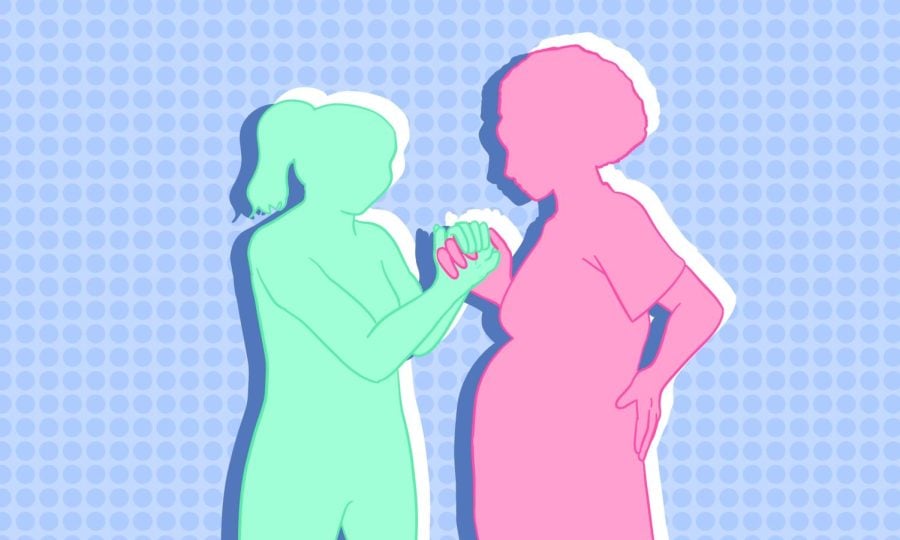Chicago Volunteer Doulas organization works to uplift those giving birth
Chicago Volunteer Doulas sends doulas to assist pregnant people in vulnerable populations in Chicagoland, as well as to assist incarcerated people during labor.
May 12, 2022
Anya Tanyavutti’s first labor and delivery lasted 84 hours. Having a doula helped Tanyavutti, who is the executive director of Chicago Volunteer Doulas, experience the birth she had always wished for.
“(Doula support) made me feel like there was nothing that was impossible in the world,” she said. “It also made me feel like I was capable of being the fiercest and most loving protector of my child, and gave me confidence to be able to do that.”
Doulas offer social and emotional support to people undergoing the birthing process and their families. They offer prenatal and postpartum care, as well as support during labor and delivery — something Tanyavutti said she feels everyone deserves to experience.
Motivated by this, Tanyavutti became involved with CVD, where she has been the executive director for three years. She is also the president of Evanston/Skokie School District 65.
CVD is a birth justice organization providing comprehensive doula support that focuses on serving vulnerable communities in the Chicago area, including incarcerated communities. Volunteer doulas commit to helping pregnant people, new parents and their families.
Lisa Kulisek, a doula with CVD, said she also had a doula present while she gave birth.
“I saw the power of having that person be next to me, being able to say to the professionals in the hospital, ‘This is what she asked for… Please respect her wishes,’” Kulisek said. “(It) didn’t take a whole lot of effort, but made a huge difference in my perception of the experience.”
CVD prioritizes serving disenfranchised communities, Tanyavutti said. Communities of color tend to experience increased rates of pregnancy-related and infant morbidity as well as limited nutrition access.
According to Tanyavutti, 90% of CVD’s doulas identify as people of color, 70% identify as Black or Brown and 82% identify as earning a low income. In addition, CVD’s board reflects the diversity of its client base. Tanyavutti said the board is 75% BIPOC-identifying and 85% gender-oppressed, and there is economic and linguistic diversity.
Nina-Marie Rueda, a volunteer doula with CVD, said as a bilingual doula, she is often able to provide a level of insight to her clients that is otherwise inaccessible.
“Working with the women that were in my community in particular was important to me,” she said. “Some of them only spoke Spanish… I’m an educator at heart, and I value people understanding the ‘why’ behind things. Serving people who are typically left without information or without options is important to me.”
Tanyavutti, who is a woman of color, said she has her Masters in education and has access to medical care. Still, she experienced an intracranial brain bleed after her third child was born.
“My family’s stability was threatened. And it could not be predicted by my income, or my educational attainment,” Tanyavutti said. “It could be predicted by my race.”
CVD also sends doulas to assist people undergoing the birthing process in prisons. Tanyavutti said CVD started the program because pregnant people in prison were generally not receiving adequate education on their pregnancies.
Tanyavutti recalled one particular incarcerated client who connected with a doula. The doula helped educate her about lactation and guided the client in providing milk for her child from inside a facility. Upon her release a few months later, Tanyavutti said the mother felt a closer bond with her child and struggled less than others with reconnecting.
Tanyavutti said people in correctional facilities reported feeling isolated, and doulas are able to help with those feelings, restoring a sense of agency and autonomy to the person giving birth.
“Our doulas are some of the most compassionate advocates for themselves, each other and their peers that I’ve ever met,” she said. “Our clients who are incarcerated deserve that compassionate care as well.”
Email: [email protected]
Twitter: @avanidkalra
Related Stories:
— Anya Tanyavutti speaks on antiracist birthwork in Chicago Volunteer Doulas event
— District 65 Curriculum and Policy Committee reviews strategic plan draft
— Northwestern study reveals possible causes of birth defects, miscarriage


